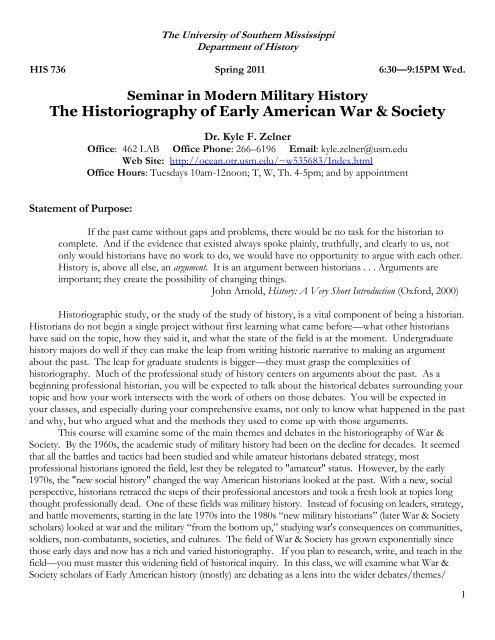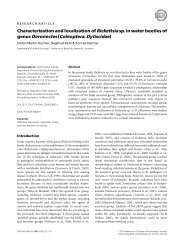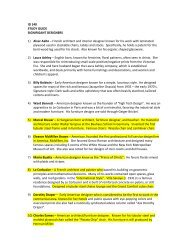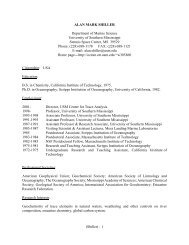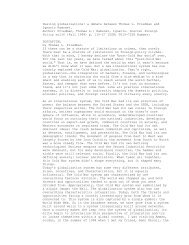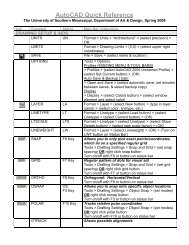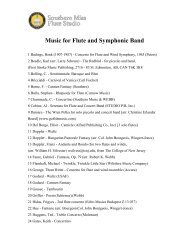HIS 736 Modern Military History Graduate Seminar - The University ...
HIS 736 Modern Military History Graduate Seminar - The University ...
HIS 736 Modern Military History Graduate Seminar - The University ...
You also want an ePaper? Increase the reach of your titles
YUMPU automatically turns print PDFs into web optimized ePapers that Google loves.
<strong>The</strong> <strong>University</strong> of Southern Mississippi<br />
Department of <strong>History</strong><br />
<strong>HIS</strong> <strong>736</strong> Spring 2011 6:30—9:15PM Wed.<br />
<strong>Seminar</strong> in <strong>Modern</strong> <strong>Military</strong> <strong>History</strong><br />
<strong>The</strong> Historiography of Early American War & Society<br />
Statement of Purpose:<br />
Dr. Kyle F. Zelner<br />
Office: 462 LAB Office Phone: 266–6196 Email: kyle.zelner@usm.edu<br />
Web Site: http://ocean.otr.usm.edu/~w535683/Index.html<br />
Office Hours: Tuesdays 10am-12noon; T, W, Th. 4-5pm; and by appointment<br />
If the past came without gaps and problems, there would be no task for the historian to<br />
complete. And if the evidence that existed always spoke plainly, truthfully, and clearly to us, not<br />
only would historians have no work to do, we would have no opportunity to argue with each other.<br />
<strong>History</strong> is, above all else, an argument. It is an argument between historians . . . Arguments are<br />
important; they create the possibility of changing things.<br />
John Arnold, <strong>History</strong>: A Very Short Introduction (Oxford, 2000)<br />
Historiographic study, or the study of the study of history, is a vital component of being a historian.<br />
Historians do not begin a single project without first learning what came before—what other historians<br />
have said on the topic, how they said it, and what the state of the field is at the moment. Undergraduate<br />
history majors do well if they can make the leap from writing historic narrative to making an argument<br />
about the past. <strong>The</strong> leap for graduate students is bigger—they must grasp the complexities of<br />
historiography. Much of the professional study of history centers on arguments about the past. As a<br />
beginning professional historian, you will be expected to talk about the historical debates surrounding your<br />
topic and how your work intersects with the work of others on those debates. You will be expected in<br />
your classes, and especially during your comprehensive exams, not only to know what happened in the past<br />
and why, but who argued what and the methods they used to come up with those arguments.<br />
This course will examine some of the main themes and debates in the historiography of War &<br />
Society. By the 1960s, the academic study of military history had been on the decline for decades. It seemed<br />
that all the battles and tactics had been studied and while amateur historians debated strategy, most<br />
professional historians ignored the field, lest they be relegated to "amateur" status. However, by the early<br />
1970s, the "new social history" changed the way American historians looked at the past. With a new, social<br />
perspective, historians retraced the steps of their professional ancestors and took a fresh look at topics long<br />
thought professionally dead. One of these fields was military history. Instead of focusing on leaders, strategy,<br />
and battle movements, starting in the late 1970s into the 1980s ―new military historians‖ (later War & Society<br />
scholars) looked at war and the military ―from the bottom up,‖ studying war's consequences on communities,<br />
soldiers, non-combatants, societies, and cultures. <strong>The</strong> field of War & Society has grown exponentially since<br />
those early days and now has a rich and varied historiography. If you plan to research, write, and teach in the<br />
field—you must master this widening field of historical inquiry. In this class, we will examine what War &<br />
Society scholars of Early American history (mostly) are debating as a lens into the wider debates/themes/<br />
1
concerns of the entire field. Once you have successfully completed this course, you will have a better<br />
understanding of many of the most important themes in the field of War & Society, which will inform your<br />
thinking as a scholar—no matter which time period or geographic location you study.<br />
Course Mechanics, Structure, and Assignments<br />
Each week we will look at a historiographical theme in the field of War & Society, usually focusing<br />
on one book and two articles. <strong>The</strong> heart of this course is the outside reading of these works and the<br />
subsequent seminar discussions about them. Needless to say, students should come to class thoroughly<br />
familiar with all of the reading assigned for that day and prepared to discuss the readings in an informed<br />
manner. Students are required to bring all assigned reading materials to class.<br />
Students will write eight book reviews during the course of the semester. At least two of the<br />
reviews must be completed by March 2 nd (more than that would be better). Book reviews are due at the<br />
beginning of class the day a book is discussed. Students may not write single reviews of Peter Silver’s or<br />
Douglas Egerton’s books (April 13 th and 20 th—see below). A critical book review should briefly describe<br />
what the book is about, but concentrate on identifying and commenting upon the author’s thesis: What is<br />
the author trying to get across, how does she/he argue the case and upon what evidence, where does it fit<br />
into the historiography, and where and to what extent do you agree and disagree? Reviews should begin<br />
with the standard bibliographical heading and end with your name and affiliation. If you are unsure how to<br />
write a critical book review, take a look at reviews in such publications as the William and Mary Quarterly or<br />
the New England Quarterly. In addition, H-Net has useful guidelines for its book reviers which may be<br />
helpful (http://www.h-net.org/reviews/guidelines_books.php). See below for minimum word<br />
requirements and grade percentages.<br />
Students will also write a comparative book review, focusing on the similarities and differences, of<br />
the books from April 13 th and 20 th (Silver and Egerton). Good examples of comparative book reviews may<br />
be found in the journal Reviews in American <strong>History</strong>.<br />
Each student will also take the lead (twice during the semester) in leading class discussion on one of<br />
the articles for that week. Discussion leaders will offer a 15 minute presentation on their article and how it<br />
addresses the historiographical debate in question. Discussion leaders should be sure to cover:<br />
● <strong>The</strong> author’s academic background (schools, mentors, methodologies, etc.)<br />
● <strong>The</strong> main thesis of the article<br />
● Major evidence used to prove thesis<br />
● Types of evidence used<br />
● Your (students’) major critiques of the article (positive and negative)<br />
Your participation in class – everything from your performance as an article discussion leader to the<br />
questions you ask your peers to the points you make about the readings (or don’t)-–will determine 25% of<br />
your final grade.<br />
<strong>The</strong> final 25% of your course grade will derive from a final exam. I will expect you to have a grasp<br />
of all articles and books from the class, as well as the field of Early American War & Society. <strong>The</strong> final<br />
exam will mimic a comprehensive exam question(s) and will be taken in exam week as a self-timed and<br />
self-proctored take-home exam. More details on this exam will come later in the course.<br />
2
Grading Breakdown:<br />
ASSIGNMENT MAX. WORDS PERCENTAGE DUE DATE .<br />
<strong>Seminar</strong> Participation (incl. N/A 25% all semester<br />
article presentations)<br />
Book Reviews (8) 800 each 40% (5% each) 2 by March 2 nd, all by May 4<br />
Comparative Review 1200 10% April 20 th<br />
Final Exam Timed 25% TBA<br />
Total 7600 100%<br />
A Note about Books and Articles:<br />
I have ordered the books for the first week of class at the USM Barnes and Noble bookstore. For<br />
the rest, I encourage you to scrounge the internet for cheap used or new copies of these works. Most of<br />
the course books are also on overnight reserve at Cook Library. Some of the articles in class will be<br />
distributed via email (usually book chapters and some articles from smaller journals), but students are<br />
expected to scout out most of the articles on their own in the index ―America: <strong>History</strong> and Life‖ and<br />
retrieve them in JSTOR, Project Muse, etc.<br />
Course Policies:<br />
1. Class Climate: In order for discussions to be productive, all students need to feel comfortable<br />
participating. We will create and maintain an atmosphere of mutual respect in which everyone’s ideas can<br />
be heard.<br />
2. USM Email: All students should check their USM email regularly—you can set it to forward to your<br />
main email account (yahoo, hotmail, etc.) if you desire, but be sure to check it in some fashion. Students<br />
who do not set up their accounts or respond to USM email can lose participation points and suffer a lower<br />
grade.<br />
3. Cell Phones: All cell phones must be turned off when in class. Any exceptions to this policy must be<br />
cleared with the instructor in advance.<br />
4. Support and Documentation: For reviews, parenthetical references of the books under review are<br />
acceptable, except in the comparative review, where students should use formal footnotes. All other<br />
notations must be formal footnotes; follow Chicago Manual of Style format. Note: I do not accept the use of<br />
―Ibid‖ in citations—instead I prefer the short author/title system.<br />
5. Manuscript Preparation: All papers should be computer-generated (12pt font, Times New Roman)<br />
and should be double-spaced with ½ inch margins. Papers should always be handed in with the pages<br />
numbered and stapled together. Clear, readable writing and careful proofreading are minimal<br />
requirements; I will not read careless, unproofed writing.<br />
All papers must also be turned into the instructor in electronic format via email (MS Word or .rtf format)<br />
as well as in hard copy during class. Be sure to use your last name in the file name, for example:<br />
Smith_Review_Oct_21.doc.<br />
3
Clearly place your name, the course and instructor, a description of the paper, and date of each<br />
assignment in the upper right hand corner of the first page.*<br />
*Sample heading for papers:<br />
Student Name<br />
<strong>History</strong> <strong>736</strong>—Dr. Zelner<br />
Book Review #6<br />
March 6, 2011<br />
*Papers which do not conform to ALL of these rules WILL suffer a grade penalty.*<br />
6. Copies of Papers: It is your responsibility to keep a copy of each paper that you submit and be able to<br />
produce it in case the original is lost.<br />
7. Late Papers: In graduate school, there should be no late papers. Extensions of a paper due date will<br />
be granted only in the event of a documented medical, academic, or personal emergency and only in<br />
advance of the paper due date. Decisions on the validity of the documentation and the penalty for any late<br />
paper (it will be severe) are within the sole purview of the instructor.<br />
8. Academic Dishonesty: Scholastic dishonesty will not be condoned under any circumstance. See the<br />
current <strong>Graduate</strong> Bulletin for a good definition of such behavior. Cheating on an exam or demonstrated<br />
plagiarism on a paper will automatically lead to a grade of ―F‖ for the course and probable dismissal from<br />
the university. <strong>The</strong> instructor reserves the right to use electronic resources, such as Turnitin.com, to detect<br />
plagiarism. If you have questions or concerns about this policy—please see the instructor during office<br />
hours.<br />
9. Students with Disabilities: If a student has a disability that qualifies under the American with<br />
Disabilities Act (ADA) and requires accommodations, he/she should contact the Office for Disability<br />
Accommodations (ODA) for information on appropriate policies and procedures. Disabilities covered by<br />
ADA may include learning, psychiatric, physical disabilities, or chronic health disorders. Students can<br />
contact ODA if they are not certain whether a medical condition/disability qualifies.<br />
Address:<br />
<strong>The</strong> <strong>University</strong> of Southern Mississippi<br />
Office for Disability Accommodations<br />
118 College Drive # 8586<br />
Hattiesburg, MS 39406-0001<br />
Voice Telephone: (601) 266-5024 or (228) 214-3232 Fax: (601) 266-6035<br />
Individuals with hearing impairments can contact ODA using the Mississippi Relay<br />
Service at 1-800-582-2233 (TTY) or email Suzy Hebert at Suzanne.Hebert@usm.edu.<br />
10. Syllabus: This syllabus is a mutual contract between the professor and student and the student and<br />
professor. It will not be altered lightly, however if circumstances make it necessary, the changes will be<br />
made as far in advance as possible and in writing.<br />
4
19 Jan. Class Introduction<br />
26 Jan. Overview of the Field(s)<br />
Course Schedule<br />
Readings with an (*) are on the War & Society <strong>Graduate</strong> Reading List<br />
*Hughes, Matthew and William Philpott, eds. Palgrave Advances in <strong>Modern</strong> <strong>Military</strong> <strong>History</strong>. New<br />
York: Palgrave Macmillian, 2007.<br />
*Lee, Wayne E. “Mind and Matter - Cultural Analysis in American <strong>Military</strong> <strong>History</strong>: A Look at the<br />
State of the Field.” Journal of American <strong>History</strong> 93, no. 4 (2007): 1116-1142.<br />
2 Feb. <strong>The</strong> <strong>Military</strong> Revolution/Rise of the State<br />
Clifford J. Rogers, <strong>The</strong> <strong>Military</strong> Revolution Debate: Readings on <strong>The</strong> <strong>Military</strong> Transformation of Early<br />
<strong>Modern</strong> Europe. Boulder, CO: Westview Press, 1995.<br />
Manning, Roger B. “Styles of Command in Seventeenth-Century English Armies.” Journal of<br />
<strong>Military</strong> <strong>History</strong>. Vol 71 No. 3 (2007): 671-699.<br />
Presenter: _____________________________________________<br />
9 Feb. Recruitment, Motivation, and Experiences of War: Colonial and Revolutionary<br />
*Anderson, Fred. A People's Army: Massachusetts Soldiers and Society in the Seven Years' War.<br />
Chapel Hill: <strong>University</strong> of North Carolina Press, 1984.<br />
Zelner, Kyle F. “<strong>The</strong> Pressed Men of Essex County: <strong>The</strong> Social Identity of the Soldiers of King<br />
Philip‟s War.” In A Rabble in Arms: Massachusetts Towns and Militiamen during King<br />
Philip’s War, 141-180. New York: New York <strong>University</strong> Press, 2009. Distributed by Dr. Zelner<br />
Presenter: _____________________________________________<br />
Neimeyer, Charles Patrick. “To Get as Much for My Skin as I Could: <strong>The</strong> Soldier as Wage Laborer.”<br />
In America Goes to War: A Social <strong>History</strong> of the Continental Army, 108-129. New York: New<br />
York <strong>University</strong> Press, 1996. Distributed by Dr. Zelner<br />
Presenter: _____________________________________________<br />
16 Feb. Recruitment, Motivation, and Experiences of War: Confederation to Civil War<br />
*Linderman, Gerald. Embattled Courage: <strong>The</strong> Experience of Combat in the American Civil War.<br />
New York: Free Press, 1987.<br />
5
Stagg, J. C. A. “Enlisted Men in the United States Army, 1812-1815: A Preliminary Survey.” William<br />
and Mary Quarterly, 3 rd Series, Vol. 43 No. 4 (October 1986): 615-645.<br />
Presenter: _____________________________________________<br />
Sheehan-Dean, Aaron. “Everyman‟s War: Confederate Enlistment in Civil War Virginia” Civil War<br />
<strong>History</strong>, Vol. L No. 1 (March 2004): 5-26.<br />
Presenter: _____________________________________________<br />
23 Feb. War and Community: <strong>The</strong> Costs of Conflict on Society<br />
*Melvoin, Richard I. New England Outpost: War and Society in Colonial Deerfield. New York:<br />
Norton, 1989.<br />
Merritt, Bruce G. “Loyalism and Social Conflict in Revolutionary Deerfield, Massachusetts.” Journal<br />
of American <strong>History</strong>, Vol. 57, No. 2 (September, 1970): 277-289.<br />
Presenter: _____________________________________________<br />
Tiedemann, Joseph S. “Patriots by Default: Queens County, New York, and the British Army,<br />
1776-1783.” William and Mary Quarterly, 3 rd Series, Vol. 43 No. 1 (January, 1986): 35-63.<br />
Presenter: _____________________________________________<br />
2 March War and Community: War Production and Economic Consequences<br />
* STUDENTS MUST HAVE A MINIMUM OF TWO BOOK REVIEWS TURNED IN BY T<strong>HIS</strong> DATE*<br />
Gallman, J. Matthew. Mastering Wartime: A Social <strong>History</strong> of Philadelphia during the Civil War. New<br />
York: Cambridge <strong>University</strong> Press, 1990.<br />
Stumpf, Stuart O. “Implications of King George‟s War for the Charleston Mercantile<br />
Community.” South Carolina Historical Magazine Vol. 77, No. 3 (July, 1976): 161-188.<br />
Distributed by Dr. Zelner<br />
Presenter: _____________________________________________<br />
Moehring, Eugene P. “<strong>The</strong> Civil War and Town Founding in the Intermountain West.” Western<br />
Historical Quarterly, Vol. 28 No. 3 (Autumn, 1997): 316-341.<br />
Presenter: _____________________________________________<br />
9 March Spring Break<br />
No class<br />
6
16 March War and Technology/Tactics<br />
*Malone, Patrick. <strong>The</strong> Skulking Way of War: Technology and Tactics among the New England<br />
Indians. Baltimore: Johns Hopkins <strong>University</strong> Press, 1993.<br />
*Chet, Guy. Conquering the American Wilderness: <strong>The</strong> Triumph of European Warfare in the Colonial<br />
Northeast. Amherst: <strong>University</strong> of Massachusetts Press, 2003.<br />
23 March War and Politics<br />
Rosswurm, Steven. Arms, Country, and Class: <strong>The</strong> Philadelphia Militia and "Lower Sort" during the<br />
American Revolution, 1775-1783. New Brunswick: Rutgers <strong>University</strong> Press, 1987.<br />
Cress, Lawrence Delbert. “Republican Liberty and National Security: American <strong>Military</strong> Policy<br />
as an Ideological Problem, 1783 to 1789.” William and Mary Quarterly, 3 rd Series, Vol. 38, No.<br />
1 (January, 1981): 73-96.<br />
Presenter: _____________________________________________<br />
White, Jonathan W. “Citizens and Soldiers: Party Competition and the Debate in Pennsylvania over<br />
Permitting Soldiers to Vote, 1861–64.” American Nineteenth Century <strong>History</strong>. Vol. 5 Issue 2,<br />
(July, 2004): 47-70.<br />
Presenter: _____________________________________________<br />
30 March War and Socio-Economic Status/Class<br />
Cox, Caroline. A Proper Sense of Honor: Service and Sacrifice in George Washington's Army. Chapel<br />
Hill: <strong>University</strong> of North Carolina Press, 2007.<br />
Way, Peter. “Class and the Common Soldier in the Seven Years‟ War.” Labor <strong>History</strong>, Vol. 44, No. 4<br />
(2003): 455-481.<br />
Presenter: _____________________________________________<br />
Glatthaar, Joseph T. “Everyman's War: A Rich and Poor Man's Fight in Lee's Army.” Civil War<br />
<strong>History</strong>. Vol. 54, No. 3, (September, 2008): 229-246.<br />
Presenter: _____________________________________________<br />
6 April War and Gender<br />
Lynn, John. Women, Armies, and Warfare in Early <strong>Modern</strong> Europe. Cambridge: Cambridge<br />
<strong>University</strong> Press, 2008.<br />
7
Little, Ann. “„Insolent‟ Squaws and „Unreasonable‟ Masters: Indian Captivity and Family Life.” In<br />
Abraham in Arms: War and Gender in Colonial New England, 91-126. Philadelphia:<br />
<strong>University</strong> of Pennsylvania Press, 2007. Distributed by Dr. Zelner<br />
Presenter: _____________________________________________<br />
Hagemann, Karen. “<strong>The</strong> <strong>Military</strong> and Masculinity: Gendering the <strong>History</strong> of the Revolutionary and<br />
Napoleonic Wars, 1792-1815.” In War in an Age of Revolution, 1775-1815, edited by Roger<br />
Chickering and Stig Förster, 331-351. Washington, D.C: German Historical Institute and<br />
Cambridge <strong>University</strong> Press, 2010. Distributed by Dr. Zelner<br />
Presenter: _____________________________________________<br />
13 April War and Race: Native American Cultures<br />
Silver, Peter. Our Savage Neighbors: How Indian War Transformed Early America. New York:<br />
Norton, 2008. *No single book review on this title.<br />
Richter, Daniel K. “War and Culture: <strong>The</strong> Iroquois Experience.” William and Mary Quarterly, Vol. 40<br />
No. 4, (October , 1983): 528-559.<br />
Presenter: _____________________________________________<br />
Lee, Wayne E. “Fortify, Fight, or Flee: Tuscarora and Cherokee Defensive Warfare and <strong>Military</strong><br />
Culture Adaptation.” Journal of <strong>Military</strong> <strong>History</strong>, Vol. 68 (July, 2004), 713-770.<br />
Presenter: _____________________________________________<br />
20 April War and Race: African American Cultures<br />
*COMPARATIVE BOOK REVIEW (ON SILVER AND EGERTON) DUE*<br />
Egerton, Douglas R. Death or Liberty: African Americans and Revolutionary America. New York:<br />
Oxford, 2009. *No single book review on this title.<br />
Reidy, Joseph P. “<strong>The</strong> African American Struggle for Citizenship Rights in the Northern United States<br />
during the Civil War” In Civil War Citizens: Race, Ethnicity, and Identity in America’s Bloodiest<br />
Conflict, edited by Susannah J. Ural, 213-236. New York: New York <strong>University</strong> Press, 2010.<br />
Distributed by Dr. Zelner<br />
Presenter: _____________________________________________<br />
Voegeli, V. Jacque. “A Rejected Alternative: Union Policy and the Relocation of Southern<br />
„Contrabands‟ at the Dawn of Emancipation.” Journal of Southern <strong>History</strong>, Vol. 69 Issue 4,<br />
(November 2003): 765-790.<br />
8
Presenter: _____________________________________________<br />
27 April War and Ethnicity/Religion<br />
*Ural, Susannah. <strong>The</strong> Harp and the Eagle: Irish-American Volunteers and the Union Army, 1861-<br />
1865. New York: New York <strong>University</strong> Press, 2006.<br />
Goodfriend, Joyce D. “Foreigners in a Dutch Colonial City.” New York <strong>History</strong>, Vol. 90 Issue 4,<br />
(Fall, 2009): 241-269.<br />
Presenter: _____________________________________________<br />
Campbell, Alexander V. “A “Nursery for Soldiers to the Whole World‟: Colonel James Prevost and<br />
the Foreign Protestant <strong>Military</strong> Migration of the Mid-Eighteenth Century.” Pennsylvania<br />
Magazine of <strong>History</strong> & Biography, Vol. 129 Issue 3 (July, 2005): 253-281. Distributed by Dr.<br />
Zelner<br />
Presenter: _____________________________________________<br />
4 May War and Culture/Mentalité<br />
*MUST HAVE ALL EIGHT (8) BOOK REVIEWS IN BY T<strong>HIS</strong> DATE*<br />
*Royster, Charles. A Revolutionary People at War: <strong>The</strong> Continental Army and American Character,<br />
1775-1783. Chapel Hill: <strong>University</strong> of North Carolina Press, 1979.<br />
Kulikoff, Allan. “Revolutionary Violence and the Origins of American Democracy.” Journal of the<br />
Historical Society, Vol. 2 Issue 2, (March, 2002): 229-260. Distributed by Dr. Zelner<br />
Presenter: _____________________________________________<br />
Storey, Margaret M. “Civil War Unionists and the Political Culture of Loyality in Alabama, 1860-<br />
1861.” Journal of Southern <strong>History</strong>, Vol. 69, No. 1 (February, 2003): 71-106.<br />
Presenter: _____________________________________________<br />
Final Exam (Due Date: TBA)<br />
9


